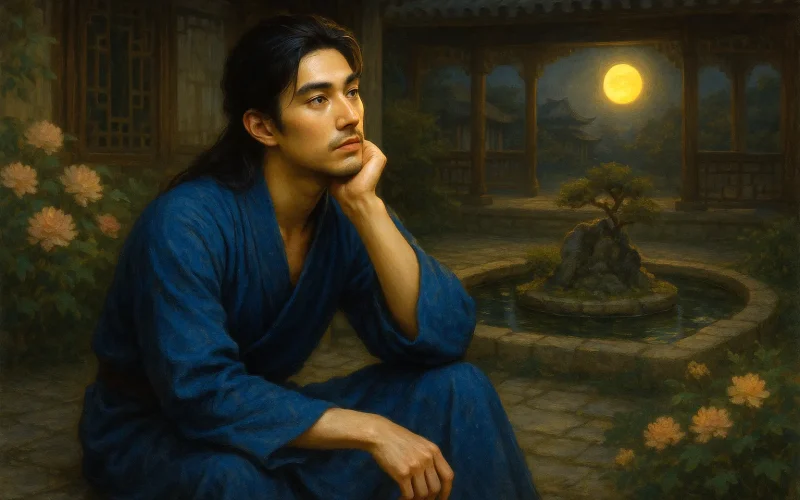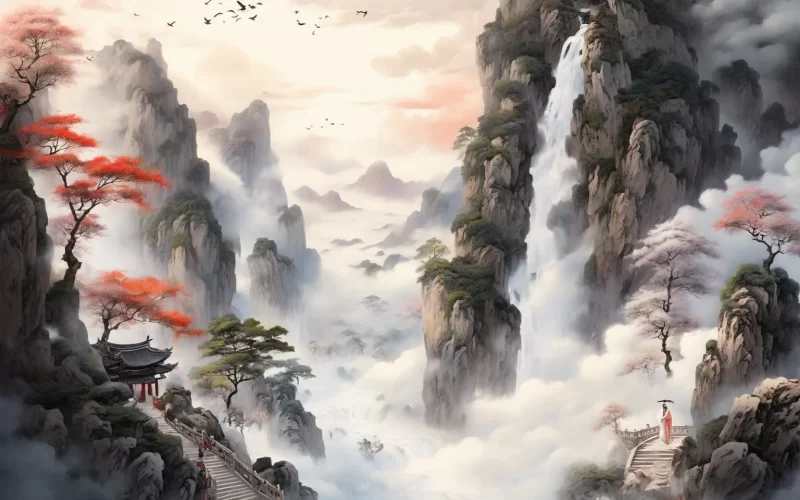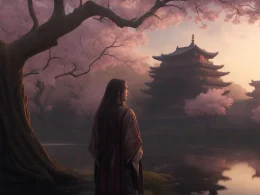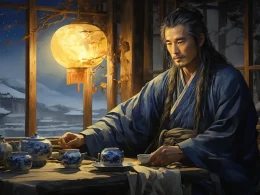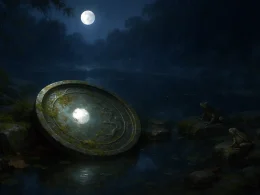"I am endlessly yearning
To be in Ch'ang-an.
...Insects hum of autumn by the gold brim of the well;
A thin frost glistens like little mi rrors on my cold mat;
The high lantern flickers; and deeper grows my longing.
I lift the shade and, with many a sigh, gaze upon the moon,
Single as a flower, centred from the clouds.
Above, I see the blueness and deepness of sky.
Below, I see the greenness and the restlessness of water
Heaven is high, earth wide; bitter between them flies my sorrow.
Can I dream through the gateway, over the mountain?
Endless longing
Breaks my heart."
Original Poem
「长相思 · 其一」
李白
长相思,在长安。
络纬秋啼金井阑,微霜凄凄簟色寒。
孤灯不明思欲绝,卷帷望月空长叹。
美人如花隔云端!
上有青冥之长天,下有渌水之波澜。
天长路远魂飞苦,梦魂不到关山难。
长相思,摧心肝!
Interpretation
Composed after Li Bai's dismissal from court by Emperor Xuanzong ("granted gold and sent away") and his departure from Chang'an in 744 CE, this work emerged from profound political setback. Initially summoned to the capital during the Tianbao era to serve as a Hanlin academician, Li Bai found the position—focused on literary entertainment rather than governance—far from his political aspirations. His proud nature clashed with the rigid bureaucracy, leading to alienation due to slander from powerful ministers. The "golden dismissal" essentially ended his political career. Thus, "Chang'an" in this poem transcends a mere city to symbolize his shattered political ideals, while the "beauty beyond clouds" represents both an admired figure and the unattainable enlightened sovereign's recognition of his ambitions—a poetic embodiment of his frustrated dreams. Through the form of romantic longing, the poem expresses the deep, endless melancholy after his ideals' collapse.
First Stanza: "长相思,在长安。络纬秋啼金井阑,微霜凄凄簟色寒。孤灯不明思欲绝,卷帷望月空长叹。美人如花隔云端!"
Cháng xiāngsī, zài Cháng'ān. Luòwěi qiū tí jīn jǐng lán, wēi shuāng qīqī diàn sè hán. Gū dēng bù míng sī yù jué, juǎn wéi wàng yuè kōng cháng tàn. Měirén rú huā gé yúnduān!
Endless longing, in Chang'an dwells, Where autumn crickets sing by golden rails. Thin frost falls bleak, mat turns cold as stone; Lone lamp flickers, my longing's overgrown. Rolling the blind, I sigh to moon alone— The flower-like beauty's beyond clouds, unknown!
The poet begins with autumn imagery, using the cricket's chirp, frost's chill, the lone lamp's gloom, and cold moonlight to create a desolate atmosphere that materializes inner solitude and longing. "Flower-like beauty beyond clouds" is the climactic line—in classical poetry, "beauty" carries specific cultural connotations, referring both to a beloved and, more often, symbolizing political ideals or the sovereign. Her "beyond clouds" position perfectly conveys the anguish of the unattainable.
Second Stanza: "上有青冥之长天,下有渌水之波澜。天长路远魂飞苦,梦魂不到关山难。长相思,摧心肝!"
Shàng yǒu qīngmíng zhī cháng tiān, xià yǒu lù shuǐ zhī bō lán. Tiān cháng lù yuǎn hún fēi kǔ, mèng hún bù dào guānshān nán. Cháng xiāngsī, cuī xīngān!
Above, blue heavens stretch vast and high; Below, green waves surge to the sky. Sky's vast, road's long, my soul flies in pain; Mountains block dreams—my quest is in vain. Endless longing—heartbreak's bitter strain!
This stanza expands the sense of separation through immense spatial imagery—the azure sky above and swirling waters below—symbolizing insurmountable obstacles on his ideal's path. "Dreams can't reach" represents ultimate despair, meaning even subconscious fantasy offers no solace. The concluding cry "heartbreak" releases all pent-up emotion, driving the poem's tragedy to its peak.
Holistic Appreciation
Set against deep autumn's bleakness, the poem expresses profound, hopeless longing. Emotion progresses layer by layer: from the interior's chilly solitude (lone lamp, frost) to the exterior's lonely moon-gazing, then to yearning for the "cloud-beyond beauty," finally升华 to cosmic lament about "vast skies and distant roads." This movement from near to far, real to virtual, continuously expands emotion's intensity and scope. While superficially depicting romantic love, the poem's core is Li Bai's subtle expression of political frustration. "Chang'an" as the geographical focus is both the beloved's home and the empire's power center; the "beauty" is his political ideal's poetic embodiment. Thus, the work is both love poem and political statement—its power lies in beautifully yet painfully conveying an individual's insignificance before fate, and their unyielding pursuit.
Artistic Merits
- Organic Imagery Integration: Rather than listing images randomly, the poet connects autumn insects, chilly frost, lone lamp, bright moon, blue sky, and green water into a unified, desolate, obstacle-filled landscape serving the core theme of "unfulfilled longing."
- Virtual-Reality Boundary Blurring: From realistic interior scenes to "cloud-beyond" imagination, then to vast "azure sky" and "swirling waters," finally landing on the ethereal "dream soul," the poetic realm continuously expands, deepening the emotion.
- "Beauty" Imagery's Allegorical Tradition: Inheriting the "fragrant grass and beauty" tradition from Qu Yuan's "Li Sao," the poem uses romantic relations to metaphorize ruler-subject dynamics, embedding deep political meaning and scholar-official frustration beneath a graceful surface.
Insights
Transcending mere romantic love, this work reveals a universal human experience: the eternal conflict between utmost longing for ideal perfection and immense pain from its unattainability. Whether toward a relationship, a dream, or an irrecoverable past, the "cloud-beyond" remoteness and "dreams can't reach" despair resonate across time. It teaches that some pursuits are inherently arduous, and those things that make us "heartbroken" often define our life's height and depth.
Poem translator
Kiang Kanghu
About the poet

Li Bai (李白), 701 - 762 A.D., whose ancestral home was in Gansu, was preceded by Li Guang, a general of the Han Dynasty. Tang poetry is one of the brightest constellations in the history of Chinese literature, and one of the brightest stars is Li Bai.






